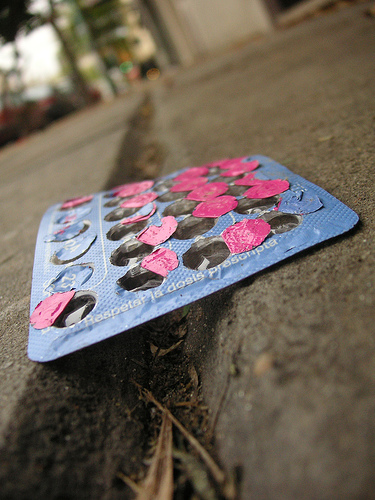Only a latter-day Rip Van Winkle could avoid knowing that this month marks the 50th anniversary of the FDA’s approval of Enovid, the world’s first birth control pill. Hundreds of newspaper and magazine articles have marked this anniversary.
Many incorrectly credit the pill with giving birth to feminism. As Elaine Tyler May notes in the current issue of Ms., the pill didn’t start the feminist movement but was in the right place at the right time:
The timing could not have been better. The feminist movement gained momentum just as the Pill became available. With the ability to control their fertility, women could take full advantage of new opportunities for education, careers and participation in public life.
But in the midst of all this celebrating, we’ve neglected another anniversary: 2010 marks the 40th anniversary of U.S. Senator Gaylord Nelson’s congressional hearings about the pill’s safety profile, which arguably did launch the women’s health movement.
That launch received a giant shove from Barbara Seaman, a magazine writer who published a book called The Doctor’s Case Against the Pill in 1969, and Alice Wolfson, a then-student and feminist activist. Seaman’s book documented medical risks of the pill–such as blood clots, decreased sex drive, mood disorders and certain cancers, and she alleged that the pharmaceutical industry had suppressed such information. Sen. Nelson was investigating other allegations against the pharmaceutical industry and read Seaman’s book, which motivated him to take on the pill as well.
At the time of the hearings, Wolfson was part of an activist collective known as D.C. Women’s Liberation. In discussing whether or not to attend the hearings, Wolfson and several other members discovered they all had experienced negative side effects of the pill, which their physicians had not warned them about. That revelation led to something bigger. As Wolfson later wrote in her memoir, “We went to the Hill to get information. We left having started a social movement.”
At the Nelson pill hearings, as they soon became known, medical experts delivered testimony about the known risks of synthetic estrogen, one of the main ingredients in birth control pills. No pill users were on the agenda. The only woman who testified was Dr. Elizabeth Connell, who expressed the fear that if dangers of the pill were publicized, women would give up birth control entirely. Connell said she worried that would lead to an explosion of unwanted pregnancies, or “Nelson babies.”
Alice Wolfson says she doesn’t remember the exact tipping point in the hearings that prompted her to speak up, but I like to think it was the moment when a medical researcher testified, “Estrogen is to cancer what fertilizer is to wheat.” Wolfson and other women raised their hands politely to comment, but when Sen. Gaylord refused to recognize them, they began shouting their questions.
Why weren’t we told about side effects?
Why aren’t any women testifying?
What happened to the women in the Puerto Rico study?
Why are you using women as guinea pigs?
Why are you letting the drug companies murder us for their profit and convenience?
The feminists immediately had the attention of reporters, and a movement was born. Seaman and Wolfson met during one of the breaks in testimony, and eventually worked together to create the National Women’s Health Network – still a vibrant and vital advocacy organization for women’s health.
The Nelson pill hearings eventually led to lower doses of estrogen in the pill (today’s oral contraceptives are about 1/10th the strength of Enovid) and perhaps more importantly, the introduction of patient package inserts, PPIs. The new FDA requirements resulted in the inclusion of printed information about risks, ingredients and side effects in pill packets, and eventually in all pharmaceuticals.
Women’s health activists went on to work for tampon safety regulations in the 1980s, resulting in an FDA mandate for consistency of absorbency ratings and warnings regarding tampon-associated Toxic Shock Syndrome (TSS); withdrawal of fen-Phen diet pills in the 1990s; ongoing revisions of the ACOG guidelines for VBAC (vaginal birth after cesarean) and so many other issues in support of women’s health, safety and well-being.
Cross-posted at Ms. magazine blog.



This is such a compelling story. Thanks for connecting the dots. If readers are able to find it, I highly recommend viewing of the documentary The Pill, a National Film Board of Canada production. https://www.onf-nfb.gc.ca/eng/collection/film/?id=33703&v=h&lg=en&exp= It includes footage of the hearings and first-hand accounts of those women who attended them. This film may change the way you think about the pill. Much has changed for the better, but 50 years later too many doctors, researchers and drug companies still arrogantly believe that they know best what’s good for women.
Here’s the summary:
The birth control pill has been described as the most powerful, most widely used drug ever developed in history. Conceived as a solution to the population explosion, it was a touchstone for the sexual liberation of the ’60s. But to what extent was medical science willing to risk lives? Released without adequate testing, the high-dose Pill caused serious side effects and, in some cases, death. When the US government convened hearings to review the drug’s safety, the new women’s health movement claimed its first major victory – patient package inserts warning about the drug’s side effects. This fascinating documentary offers a look at the hidden history of the oral contraceptive that changed the world and features interviews with Gloria Steinem and author Barbara Seaman, who wrote The Doctor’s Case Against the Pill in 1969.
Thanks, Laura. I haven’t seen that film, but I’ve read about it. It sounds remarkably similar to a U.S. film produced by PBS a few years ago for their “American Experience” series. The website has some transcripts from the film, and additional materials for teaching and discussion. I’ve shown the film several times in classes, and it always has a powerful effect on students.
The PBS film was one of my sources for developing this article!